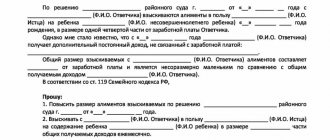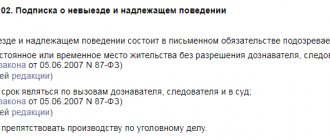1. At the end of the inquiry, the investigator draws up an indictment, which indicates: 1) the date and place of its preparation; 2) position, surname, initials of the person who compiled it; 3) information about the person brought to criminal liability; 4) the place and time of the commission of the crime, its methods, motives, goals, consequences and other circumstances relevant to the given criminal case; 5) the wording of the charge indicating the paragraph, part, article of the Criminal Code of the Russian Federation; 6) a list of evidence supporting the accusation and a summary of its content, as well as a list of evidence referred to by the defense and a summary of its content; 7) circumstances mitigating and aggravating punishment; information about the victim, the nature and extent of the harm caused to him; 9) list of persons subject to summons to court.
2. The accused and his defense attorney must be familiarized with the indictment and the materials of the criminal case, which is noted in the protocol of familiarization with the materials of the criminal case.
3. The victim or his representative, at his request, may be provided with the indictment and materials of the criminal case for review in the same manner as established by part two of this article for the accused and his defense attorney.
3.1. The indictment is accompanied by a certificate about the timing of the inquiry, about the chosen preventive measures indicating the time of detention and house arrest, about material evidence, a civil claim, measures taken to ensure the execution of a fine, to ensure a civil claim and possible confiscation of property, procedural costs, and if the accused or victim has dependents - about the measures taken to ensure their rights. The certificate must indicate the relevant pages of the criminal case.
4. The indictment drawn up by the inquiry officer is approved by the head of the inquiry body. The materials of the criminal case, together with the indictment, are sent to the prosecutor.
What other documents are there?
- All documents from the “Conclusion” section
- Categories of all standard samples and document forms
What else to download on the topic “Conclusion”:
- Recommended forms of forms for registration of materials on technical condition control. Conclusion (Protocol) of measuring the radius and ovality of bent pipeline bends
- Recommended forms of forms for registration of materials on monitoring the technical condition of the pipeline. Conclusion on measuring the wall thickness of pipeline tees and tie-ins
- Sample conclusion form for the section “Engineering and technical measures of civil defense. Measures to prevent emergency situations” construction project, construction project of a civil defense facility. Form N 3
- Sample form of conclusion on the possibility of issuing a license with the right to develop the section “Engineering and technical measures of civil defense. Measures to prevent emergency situations” of the construction project. Form N 4
- Sample conclusion of the industrial safety examination of fire protection projects for coal mines and hazardous production facilities in the coal industry
- Important nuances when buying a company
- The process of transferring an apartment to another person
- US Visa Process
- Car selling process
- Garage construction process (from a bureaucratic point of view)
Commentary on Article 225 of the Code of Criminal Procedure of the Russian Federation
The indictment and the indictment have many common features and are close in nature.
The similarity of these documents lies in the precise recording of the progress of the pre-trial investigation and its results. The following document differences are distinguished:
- The subject of the investigation (the act is signed by the investigator, the conclusion is signed by the investigator).
- Composition in accordance with the Special Part of the Criminal Code of the Russian Federation (charges under the act are brought for crimes that do not pose a great danger to society).
- Structure (all facts in the act are presented briefly, the conclusion includes descriptive and operative blocks).
- Time limit (the actions of the investigator are limited to more strict time frames).
- Determination of status (the conclusion only describes information about the results of the investigation; signing the act transfers the suspect to the accused).
The difference between an act and a conclusion lies in the legal subtleties of the process. The significance of the final document of the inquiry lies in assigning the person the status of an accused before the judicial investigation, and the indictment confirms this.
Article 225 describes in detail all stages of filling out the charge form:
- decision on the sufficiency of the collected evidence (made by the investigator independently);
- delivery (sending) copies of the document to the suspect and his lawyer;
- clarification of the defense position (written comments, complaints, petitions);
- signing a protocol of familiarization of all participants in the investigation.
The final approval of the indictment means the presence of convincing evidence of the guilt of the subject of the crime. The official's preconceived opinion and unverified evidence most often lead to the return of the case from the prosecutor's office for additional investigation. The personal position of the investigator cannot influence the pre-trial investigation and judicial proceedings.
The indictment and the indictment are similar in content and form. The resolution is drawn up during an abbreviated inquiry procedure (for example, the citizen confessed to everything and actively contributed to the investigation). The document lists the facts and evidence of guilt.
In the process of reviewing the indictment documents, interested parties may submit the following requests:
- Recognize the evidence provided by the investigator as inadmissible.
- Carry out investigative measures to verify the accuracy of individual facts.
- Take additional steps to collect evidence confirming the person’s guilt.
- Re-draft the resolution, since it was made in violation of articles of the Code of Criminal Procedure of the Russian Federation.
In contrast to the act, the period for drawing up the resolution is 10 days. All types of indictment documents are accompanied by information about the witnesses who need to be questioned at the court hearing (last name, first name, patronymic, actual residential address).
What is the difference between an investigation and an inquiry?
The research of the issues is carried out by analyzing the existing scientific works of the authors on this topic.
In the theory of criminal procedure, a large number of scientific works by various authors are devoted to the topic of inquiry and preliminary investigation. The main issues of the topics under study were the place of these two forms of criminal procedural activity in the preliminary investigation, their differences from each other and the characteristics of each as a form of preliminary investigation, and all these issues, one way or another, are intertwined.
The current Code of Criminal Procedure of the Russian Federation in paragraph 8 of Art. 5 considers inquiry as a type of preliminary investigation carried out by an investigator, in criminal cases in which a preliminary investigation is not necessary. Although previously an inquiry was also called an activity for which a preliminary investigation is mandatory. Now, clause 19 of Art. 5 of the Code of Criminal Procedure of the Russian Federation classifies this form as an urgent investigative action. Unlike inquiry, preliminary investigation is understood as a form of preliminary investigation, consisting of procedural actions and decisions, including the implementation of investigative actions, the use of criminal coercive measures, the involvement of persons as accused in the case, etc.
Sample document
“APPROVED” Prosecutor of the Sovetsky District of Ensk, Senior Adviser of Justice O.A. Fomin “25” August 201* “APPROVED” Head of the Sovetsky District Department of Internal Affairs of Ensk, Police Colonel R.D. Mukhamedshin "24" August 201*
INdictment charging Roman Vladimirovich Yushkin with committing a crime under Art. 30, part 1 art. 158 of the Criminal Code of the Russian Federation
ACCUSED:
1. Last name, first name, patronymic: Yushkin Roman Vladimirovich 2. Date of birth: December 1, 1976 3. Place of birth: Ensk 4. Place of residence Ensk, st.
M. Gorkogo, building 20, and (or) registration: apt. 44 5. Citizenship: citizen of the Russian Federation 6. Education: secondary 7. Marital status, family composition: single 8. Place of work or study: auto mechanic of workshop No. 5 of AK Enskmashzavod telephone: tel.: 568-44-11 9. Attitude to military is registered with the RVK duties: Sovetsky district of the city of Ensk 10. Criminal record: no conviction 11. Passport or other document, passport 70 0* N 234111 identification issued by the Sovetsky District Department of Internal Affairs of the city of Ensk of the accused: 10/14/201* 12. Other information about the identity at the place of work and residence of the accused <13>: it is characterized positively in that on December 5, 201* in the evening, he was at his workplace in workshop No. 5 of the Enskmashzavod AK, which is located on the street. Mosin in Ensk, took 3 new spare parts for the Ensk-3 motorcycle from a box with finished products. With these spare parts Yushkin R.V. decided to take possession, secretly remove them from the factory and sell them on the market. The total cost of the parts is 1050 rubles. 45 kopecks To realize his criminal intent Yushkin R.V. due to circumstances beyond his control, he could not. When leaving the territory of the plant, he was detained by operational duty officers of the public security bureau Kolomensky L.I. and Bolshakov V.M., in connection with which he was taken to the guardhouse, where the objects of the criminal attack were demanded from him, i.e. in committing a crime under Art. 30 and part 1 art. 158 of the Criminal Code of the Russian Federation - attempted secret theft of someone else's property (theft).
The evidence supporting the accusation is: the testimony of the suspect R.V. Yushkin, who confessed that on December 5, 201* in the evening, while at his workplace in workshop No. 5 of the Enskmashzavod AK, which is located on the street. Mosin in Ensk, took 3 new spare parts for the Ensk-3 motorcycle from a box with finished products and wanted to take them out through the entrance (case sheet 5); protocol of claim from Yushkin R.V. spare parts for the Ensk-3 motorcycle (case sheet 2); testimony of witnesses: Kolomensky L.I. (case file 6) and V.M. Bolshakova, who told how they found 3 new spare parts for the Ensk-3 motorcycle at R. Yushkin’s exit through the entrance of the Enskmashzavod AK (case sheet 7), and also a conclusion of a forensic technical examination on the suitability of spare parts for use (case sheet 3) and a certificate of the cost of spare parts (case sheet 8).
Evidence referred to by the accused and his defense lawyer: testimony of the suspect R.V. Yushkin, who referred to the delay in wages as the reason for his theft (case file 9).
There are no circumstances mitigating or aggravating the punishment of R.V. Yushkin in the case.
Information about the victim: AK “Enskmashzavod”, legal address: Ensk, st. Mosina, house 2. Representative of the victim Valentina Ivanovna Sidorova, born May 12, 1988, residence: Ensk, st. M. Gogol, house 19, citizen of the Russian Federation, higher education, legal consultant of Profit LLP (case sheet 18-19) <14>.
Civil plaintiff: AK “Enskmashzavod”, legal address: Ensk, st. Mosina, house 2. Representative of the civil plaintiff: Sidorova Valentina Ivanovna, legal consultant of Profit LLP (case sheets 18, 20).
The indictment was drawn up at the Sovetsky District Department of Internal Affairs of Ensk on August 24, 201* and in accordance with Part 4 of Art. 225 of the Code of Criminal Procedure of the Russian Federation, together with criminal case No. 117764-0*, was sent to the prosecutor of the Sovetsky district of Ensk.
Senior district commissioner of the Sovetsky District Department of Internal Affairs of Ensk, police captain A.V. Kafelnikov
LIST of persons to be summoned to the court hearing
1. Accused: Yushkin Roman Ensk, st. M. Gorkogo, 20, Vladimirovich apt. 44 (case sheets 5 and 9). 2. Representative of the victim and civil plaintiff: Valentina Sidorova, Ensk, st. Gogol, house 19 Ivanovna (case sheet 18-20). 3. Witnesses: Kolomensky Lev, Ensk, st. Matveeva, house 17, Ivanovich apt. 23 (case file 6). Bolshakov Vadim Ensk, st. Entuziastov Ave., building 1, Mikhailovich apt. 2 (case sheet 7). Senior district commissioner of the Sovetsky District Department of Internal Affairs of Ensk, police captain A.V. Kafelnikov
——————————–
<13> If there are several accused in a criminal case, then columns 1 – 12 are filled in for each of them.
<14> If there are several victims in a criminal case, then this column is filled in for each of them.
Article 222. Sending a criminal case to court
Commentary on Article 222 of the Code of Criminal Procedure of the Russian Federation - the Criminal Procedure Code of the Russian Federation in the current version with amendments entered into force in 2013
1. A criminal case in which the prosecutor has approved an indictment must be sent to court without delay. From this moment on, the case leaves the jurisdiction of the criminal prosecution authorities and comes under the jurisdiction of the justice authority. From now on, any petitions and complaints raised by the participants in the process can only be addressed to the court. The accused in custody is transferred to the court. Responsibility for the fate of material evidence now also rests with the court.
2. Simultaneously with the referral of the criminal case to the court, the accused is handed a copy of the indictment without fail, and the defense lawyer and the victim - upon their request. In any case, the victim, as well as the civil plaintiff, civil defendant and (or) their representatives are notified of the referral of the criminal case to the court. At the same time, it is explained to them that from this moment these participants in the process have the right to petition the court to conduct a preliminary hearing of the case (for its essence, see the commentary to Chapter 34 of the Code of Criminal Procedure).
3. As many as three parts of the commented article (second, third and fourth) are devoted to guarantees of timely delivery to the accused of a copy of the indictment, without which the defense cannot properly prepare for the contest in court. Failure to provide the accused with a copy of the indictment serves as one of the grounds for returning the criminal case to the prosecutor from the stage of scheduling a trial (clause 2 of part one of Article 237 of the Code of Criminal Procedure). But a properly documented refusal of the accused to receive a copy of the indictment, failure to appear when summoned, as well as evasion in any other way from receiving such a copy from the prosecutor gives the latter the right to immediately send the criminal case to court. There is no provision for sending a copy of the indictment to the accused by mail, by courier, through a defense attorney or by other means; the law speaks of the delivery of a document (from hand to hand). The Supreme Court of the Russian Federation explains: “The classification of an indictment as classified does not prevent, subject to the established rules for handling classified information, the delivery of an indictment to the accused, or the familiarization of a lawyer with the contents of the indictment...” (Determination of the Judicial Collegium for Criminal Cases of the Supreme Court of the Russian Federation dated November 13, 2006 in the case of B. and others // Bulletin of the Supreme Court of the Russian Federation. 2007. N 10. P. 14).
4. When a criminal case is sent to court, the prosecutor decides who will support the state prosecution. The Prosecutor General of the Russian Federation requires the prosecutors subordinate to him - the heads of the prosecutor's office - to regularly personally support the prosecution in court, and to appoint public prosecutors in advance, thereby ensuring that they thoroughly study the materials of the criminal case. For the most complex cases, create groups of public prosecutors, distributing their responsibilities in relation to the specifics of the case. If the public prosecutor fundamentally disagrees with the contents and conclusions of the indictment, he is obliged to inform the chief prosecutor about this, and the latter must decide on replacing the public prosecutor by appointing as such the prosecutor who approved the indictment, or take over the function of maintaining the public prosecution ( clause 1.10 of the Order of the Prosecutor General of the Russian Federation of June 3, 2002 N 28 “On the organization of the work of prosecutors in the judicial stages of criminal proceedings”). The Supreme Court of the Russian Federation explains: “The classification of an indictment as classified does not prevent, subject to the established rules for handling classified information, the delivery of an indictment to the accused, or the familiarization of a lawyer with the contents of the indictment...” (Determination of the Judicial Collegium for Criminal Cases of the Supreme Court of the Russian Federation dated November 13, 2006 in the case of B. and others // Bulletin of the Supreme Court of the Russian Federation. 2007. N 10. P. 14).
5. Broadcast
the text of the indictment on an electronic storage medium in the absence of a written refusal of the accused to
receive
a copy of this document in typewritten form cannot be considered as the legal
delivery
of a copy of the indictment (part two of the commented article) and entails the return of the criminal case to the prosecutor (Bulletin of the Supreme Court of the Russian Federation. 2001. N eleven).
Rate this item:1.002.003.004.005.00Submit Rating
No votes yet.
Please wait…
What are the differences and similarities between an act and a resolution
A lot of people confuse the indictment and the indictment; this is not at all strange, because the documents are similar in purpose, but there are still differences in the content of each of them.
Unlike the conclusion, the act has a dual purpose. The indictment not only represents the end of the inquiry procedure, but also gives the subject of criminal proceedings the procedural status of the accused. According to Art. 225 of the Code of Criminal Procedure of the Russian Federation, the act contains a conclusion about the need to forward the criminal case to the prosecutor for its subsequent transfer to court. The indictment contains only information about the results of the pre-trial investigation.
An indictment is made by the investigator if the investigative actions are completed and the collected amount of evidence is sufficient for a reasonable conclusion that a crime has been committed by a specific person. The document is issued if a shortened form of inquiry takes place, for example, if the criminal confessed to everything and cooperated with the investigation. The indictment lists the circumstances that take place in a particular proceeding and prove guilt, according to Art. 225 Code of Criminal Procedure of the Russian Federation.
In their content and form, the indictment and the indictment practically repeat each other. The resolution, according to Article 225 of the Code of Criminal Procedure of the Russian Federation, must be drawn up no later than 10 days from the date of the decision to conduct an inquiry in an abbreviated form.
After signing by the investigator and the head of the investigative body, the conclusion and act are handed over to the parties to the process for review. Both parties have the right to submit the following requests:
- on recognizing the evidence specified in the indictment or act as inadmissible;
- on carrying out additional investigative and other actions to supplement the evidence base, which is not sufficient for an objective conclusion about the involvement of a particular subject in a crime;
- on the performance of additional investigative actions aimed at verifying the reliability of evidence that raises doubts;
- on restatement of the resolution if it does not meet the requirements of Part 1 of Art. 2267 Code of Criminal Procedure.
If, before the expiration of the period specified for familiarization with the resolution or act, no petition is filed, the document is sent to the prosecutor and the judge. The indictment and the act must be accompanied by a certificate indicating information about the place of residence or location of the witnesses who must testify in court.
There must be a certificate describing the preventive measure that was chosen for the suspected person, the period of inquiry in an abbreviated form and information about the presence of dependents of the arrested offender. If there are dependents, then the measures that have been taken to preserve their legal rights are described.
Together with the indictment or resolution drawn up in accordance with the instructions of Art. 225 of the Code of Criminal Procedure of the Russian Federation, all materials of the case are transferred to the prosecutor
It is important to note that the state prosecutor - prosecutor has the right, by his decision, to exclude certain points from the charge, to reclassify the criminal act, or to order the re-drafting of the resolution and act if there are inaccuracies. If the prosecutor approves the charge, the trial begins
After approval of the resolution or act by the prosecutor, petitions and statements related to the criminal case must be submitted to the judge, not the prosecutor.
What it is
The indictment of the Criminal Procedure Code in the Russian Federation is a procedural act that contains conclusions about the investigative work done and forms the outcome of the investigation.
The issuance of such a paper will mean the completion of the preliminary investigation stage and the transfer of the case to the prosecutor for prosecution.
In criminal proceedings, such a document acts as an appeal from law enforcement officers to the court, so that the case is resolved through legal proceedings and a sentence is passed. Such an act can only come from persons carrying out investigative measures.
Art. 220 in the Code of Criminal Procedure of the Russian Federation, as well as the commentary to it, establish the requirements, tasks and goals of such an act.
In addition, such a paper must always meet a number of requirements for its content and order of preparation:
- the events of the crime should be specifically indicated and the events should be individualized in relation to the accused;
- if there are several elements, for example, murder and theft, all events should be reflected here in detail, but with specification of each of them;
- the sample of any accusation presupposes the absence of information that violates the interests of the criminal, exaggerating the degree of his guilt;
- evidence in the case should not be presented, as this may cause pressure on the prosecutor and the court before they conduct a detailed and independent study of the case materials;
- all events must be reflected either in chronological order or systematically; a combination of these methods of displaying information for several criminal episodes is allowed;
- accusing a person when adopting the specified act should be with the same wording as when drawing up a resolution to bring him in as a suspect;
- the document must contain references to the case materials, despite the fact that there should not be a direct reference to evidence;
- It is always necessary to draw up an annex, indicate the persons involved in the case, a list of evidence, but without explaining it, and so on.
The document, signed exclusively by the investigator, is ultimately transferred to higher authorities. The document must be approved by the leadership of the investigative agency, as well as by the prosecutor.
Accordingly, based on the essence of the prosecution’s conclusion, it performs several functions at once, since it is an integral part of solving the crime. Firstly, the indictment document forms the result of the investigator’s work, draws conclusions that must subsequently be verified and applied as a basis when making a decision by the court.
Secondly, the presence of the procedural act in question guarantees legality. Changing the information is not allowed after it has been signed and approved at the discretion of the participants in the investigation, which ensures the protection of the interests of the perpetrators.
In addition, control by the prosecutor’s office also makes it possible to bring the results of the investigators’ work to legality and justice.
And thirdly, any violations associated with the preparation and adoption of the indictment exclude the possibility of further transfer of the case to higher authorities. Completing all stages of the investigation guarantees its legality and will not allow the perpetrator to escape punishment due to procedural shortcomings in the case.
Commentary to Art. 220 of the Criminal Procedure Code of the Russian Federation
Comments on the articles of the Code of Criminal Procedure will help you understand the nuances of criminal procedure law.
1. An indictment is a procedural act that completes the preliminary investigation of a criminal case and formulates, on the basis of the collected evidence, an accusation against a specific person (or persons). It is drawn up by the investigator upon completion of the preliminary investigation and familiarization of the participants in the criminal proceedings with its materials.
2. Based on the indictment, the prosecutor concludes that it is necessary to send the criminal case to the court, and the court, within the limits indicated therein, considers the criminal case and makes a verdict. When considering a case at any stage of the process, the court does not have the right to go beyond the scope of the charges formulated in the indictment, both in terms of its factual side and in terms of the qualification of the offense and the range of aggravating circumstances.
3. The significance of the indictment as a procedural document defining the limits of the trial in a criminal case, however, remains only until the prosecutor has completely or partially abandoned the charge or changed it during the preliminary hearing or at the court hearing before the removal of the court in deliberation room to decide the sentence in favor of mitigation. In such cases, the indictment either completely loses its significance or retains it within the framework indicated by the changed position of the prosecutor (see Ruling of the Constitutional Court of the Russian Federation dated 07/05/2000 N 150-O at the request of the Prosecutor General of the Russian Federation for an official clarification of the Resolution of the Constitutional Court of the Russian Federation dated 20.04 .1999 in the case of verifying the constitutionality of clauses 1 and 3 of part 1 of article 232, part 4 of article 248 and part 1 of article 258 of the Code of Criminal Procedure of the RSFSR // Supreme Court of the Russian Federation. 2000. No. 6).
4. Part 1 of the commented article lists the main circumstances that must be indicated in the indictment, however, the structure of the indictment for each specific criminal case may have certain features: in one case, a description of the circumstances of the crime can be given in chronological order, in another - in order interconnected episodes of criminal activity, in the third - it may be more appropriate to present the essence of the charge in relation to each accused. However, in any case, in relation to each accused, the following must be indicated separately: the wording of the charge, indicating the relevant paragraph, part and article; evidence supporting the accusation, evidence referred to by the defense; mitigating and aggravating circumstances. Separately, information about each of the victims, civil plaintiffs and civil defendants must also be provided.
5. References to evidence contained in the indictment or data provided in it about the participants in the criminal proceedings must be accompanied by an indication of the corresponding page and volume of the criminal case. After signing the indictment, supplementing the criminal case materials with any new documents or other materials is not allowed.
6. The wording of the charge in the indictment cannot, in its scope, go beyond that contained in the decision to bring the person as an accused, but it may be narrower than it. If the circumstances of the case indicate the need to change the charge previously brought against a person to a more serious one or one that differs significantly in factual circumstances, the investigator must issue a new resolution to bring him as an accused, present it to the accused, interrogate the accused on the new charge, and only after that include the new wording of the charge in the closing indictment.
7. The indictment is signed by the investigator in charge of the criminal case, and if the preliminary investigation was carried out by several investigators simultaneously, then by the head of the investigative team.
8. In accordance with parts 5 and 6 of the commented article, the indictment is accompanied by a list of persons to be summoned to the court hearing, as well as a certificate of the case (indicating the sheets of the criminal case).
9. If the accused or victim does not speak the language in which the preliminary investigation was conducted, the investigator must ensure that the indictment is translated into his native language or a language that he speaks.
Question 4. Completion of the inquiry with the drawing up of an indictment
At the final stage of the preliminary investigation in the form of an inquiry, if there is sufficient evidence to implicate a person as an accused, an indictment is drawn up. Unlike an indictment, an indictment is a simplified in form, but an important procedural document drawn up by an investigator conducting a preliminary investigation into a criminal case under investigation.
The procedural procedure for completing an inquiry with drawing up an indictment consists of a number of sequential actions, which are:
· systematization of the materials of the criminal case (similar actions as in the criminal case investigated by the investigator);
· drawing up an indictment;
· familiarization of the parties with the indictment and materials of the criminal case;
· approval by the head of the body of the indictment and referral of the criminal case to the prosecutor.
The peculiarity of the indictment is that it slows down two procedural documents drawn up during the preliminary investigation of a criminal case: a resolution to charge a person as an accused and an indictment.
Drawing up an indictment not only means completing the inquiry and making a decision to send the criminal case to the prosecutor for its subsequent transfer to court, but also gives the person in respect of whom the inquiry was carried out the procedural status of the accused (clause 2, part 1, article 47 of the Code of Criminal Procedure of the Russian Federation ).
The indictment is drawn up in accordance with the requirements for this procedural document of Part 1 of Article 225 of the Code of Criminal Procedure of the Russian Federation. It states:
— date and place of compilation;
- position, surname, initials of the person who compiled it;
— information about the person brought to criminal liability;
- the place and time of the crime, its methods, motives, goals, consequences and other circumstances relevant to the criminal case;
— wording of the charge indicating the paragraph, part, article of the Criminal Code of the Russian Federation
- a list of evidence supporting the accusation and a list of evidence referred to by the defense;
— circumstances mitigating and aggravating punishment;
— information about the victim, the nature and extent of the harm caused to him;
— list of persons to be summoned to court.
Since the indictment contains charges and from the moment it is issued the person in respect of whom this decision is made becomes the accused, he must immediately be familiarized not only with the accusation but also with the complex of procedural rights provided for in Part 4 of Article 47 of the Code of Criminal Procedure of the Russian Federation. Simultaneously with the indictment, the accused is presented with the materials of the criminal case, about which the investigator draws up a protocol for familiarizing himself with the materials of the case (Part 2 of Article 225 of the Code of Criminal Procedure of the Russian Federation). If a defense attorney is involved in the case, then he is also presented with the entire criminal proceedings. Similar actions are carried out by the investigator with the victim or his representative if they receive a request to familiarize themselves with the indictment and case materials (Part 3 of Article 225 of the Code of Criminal Procedure of the Russian Federation).
The order of familiarization with the indictment and materials of the criminal case of the defense parties (accused, counsel) and the prosecution (victim representative) in Art. 225 of the Code of Criminal Procedure of the Russian Federation is not indicated, i.e. The investigator has the right to acquaint the parties with the case in any order[72].
In accordance with the law, only the victim can become familiar with the materials of the inquiry; his representative, the accused, his defense attorney (parts 2 and 3 of Article 225 of the Code of Criminal Procedure of the Russian Federation). As for familiarization with the case of the civil plaintiff, civil defendant, and their representatives, the above norm of the Code of Criminal Procedure of the Russian Federation does not provide for this in simplified proceedings, and this, in turn, contradicts Art. 46 and 52 of the Constitution of the Russian Federation. Therefore, when the indicated persons file a petition, the investigator is obliged to present the materials of the criminal case regarding the civil claim filed. Moreover, the right of a civil plaintiff and a civil defendant to familiarize themselves with the case materials in the specified volume is enshrined, respectively, in clause 12, part 4 and clause 9, part 2 of Art. 54, 55 Code of Criminal Procedure of the Russian Federation.
The time for the parties to familiarize themselves with the materials of the completed inquiry is not limited by law.
Participants of the parties, in accordance with their legal status, have the right to submit petitions, including to supplement the inquiry.
The Code of Criminal Procedure of the Russian Federation does not give a definite answer to the question of whether the investigator has the right to carry out investigative actions at the request of the parties after the indictment and materials of the criminal case have been drawn up and presented for review. Among procedural scientists, there is an opinion that if, when familiarizing yourself with a criminal case, the inquiry period does not expire, then it is not possible to carry out investigative actions, since an inquiry in criminal cases is, in essence, a simplified and abbreviated form of investigation. Satisfying the parties’ requests to supplement the inquiry by carrying out investigative actions would turn the inquiry “into a semblance of an investigation.” Thus, requests from the parties to supplement the case materials must be addressed to the prosecutor and the court, which resolve them. The prosecutor, making decisions at the request of the parties, has the right to forward the criminal case for additional inquiry or investigation (clauses 2 and 4 of part 1 of article 226 of the Code of Criminal Procedure of the Russian Federation).
Taking into account the requests of the parties, the investigator has the right to change the indictment both when familiarizing the parties with the case and immediately after familiarization. In particular, at the request of the parties, the lists of witnesses may be changed. The indictment can also be changed from the point of view of the prosecution, but in such a way that the position of the accused is not worsened[73].
The law does not stipulate the drawing up as an annex to the indictment of a certificate containing information about the progress of the case, the location of the accused, measures to ensure a civil claim and possible confiscation, the stated procedural costs, and the place of storage of material evidence. This certificate (unlike the indictment) is drawn up if necessary.
After the parties have familiarized themselves with the indictment and the materials of the criminal case, the indictment in the required number of copies is submitted to the head of the inquiry agency for approval. Within the meaning of the law, the head of the inquiry agency has the right to demand that the interrogating officer re-draft the indictment and make changes to it (clause 17 of article 5, part 4 of article 41 of the Code of Criminal Procedure of the Russian Federation).
After the indictment is approved, the criminal case is immediately sent to the prosecutor. If the accused does not speak the language of criminal proceedings, a translation of this procedural document into a language that the accused speaks is provided with the indictment.
At the final stage of the preliminary investigation in the form of an inquiry, if there is sufficient evidence to implicate a person as an accused, an indictment is drawn up. Unlike an indictment, an indictment is a simplified in form, but an important procedural document drawn up by an investigator conducting a preliminary investigation into a criminal case under investigation.
The procedural procedure for completing an inquiry with drawing up an indictment consists of a number of sequential actions, which are:
· systematization of the materials of the criminal case (similar actions as in the criminal case investigated by the investigator);
· drawing up an indictment;
· familiarization of the parties with the indictment and materials of the criminal case;
· approval by the head of the body of the indictment and referral of the criminal case to the prosecutor.
The peculiarity of the indictment is that it slows down two procedural documents drawn up during the preliminary investigation of a criminal case: a resolution to charge a person as an accused and an indictment.
Drawing up an indictment not only means completing the inquiry and making a decision to send the criminal case to the prosecutor for its subsequent transfer to court, but also gives the person in respect of whom the inquiry was carried out the procedural status of the accused (clause 2, part 1, article 47 of the Code of Criminal Procedure of the Russian Federation ).
The indictment is drawn up in accordance with the requirements for this procedural document of Part 1 of Article 225 of the Code of Criminal Procedure of the Russian Federation. It states:
— date and place of compilation;
- position, surname, initials of the person who compiled it;
— information about the person brought to criminal liability;
- the place and time of the crime, its methods, motives, goals, consequences and other circumstances relevant to the criminal case;
— wording of the charge indicating the paragraph, part, article of the Criminal Code of the Russian Federation
- a list of evidence supporting the accusation and a list of evidence referred to by the defense;
— circumstances mitigating and aggravating punishment;
— information about the victim, the nature and extent of the harm caused to him;
— list of persons to be summoned to court.
Since the indictment contains charges and from the moment it is issued the person in respect of whom this decision is made becomes the accused, he must immediately be familiarized not only with the accusation but also with the complex of procedural rights provided for in Part 4 of Article 47 of the Code of Criminal Procedure of the Russian Federation. Simultaneously with the indictment, the accused is presented with the materials of the criminal case, about which the investigator draws up a protocol for familiarizing himself with the materials of the case (Part 2 of Article 225 of the Code of Criminal Procedure of the Russian Federation). If a defense attorney is involved in the case, then he is also presented with the entire criminal proceedings. Similar actions are carried out by the investigator with the victim or his representative if they receive a request to familiarize themselves with the indictment and case materials (Part 3 of Article 225 of the Code of Criminal Procedure of the Russian Federation).
The order of familiarization with the indictment and materials of the criminal case of the defense parties (accused, counsel) and the prosecution (victim representative) in Art. 225 of the Code of Criminal Procedure of the Russian Federation is not indicated, i.e. The investigator has the right to acquaint the parties with the case in any order[72].
In accordance with the law, only the victim can become familiar with the materials of the inquiry; his representative, the accused, his defense attorney (parts 2 and 3 of Article 225 of the Code of Criminal Procedure of the Russian Federation). As for familiarization with the case of the civil plaintiff, civil defendant, and their representatives, the above norm of the Code of Criminal Procedure of the Russian Federation does not provide for this in simplified proceedings, and this, in turn, contradicts Art. 46 and 52 of the Constitution of the Russian Federation. Therefore, when the indicated persons file a petition, the investigator is obliged to present the materials of the criminal case regarding the civil claim filed. Moreover, the right of a civil plaintiff and a civil defendant to familiarize themselves with the case materials in the specified volume is enshrined, respectively, in clause 12, part 4 and clause 9, part 2 of Art. 54, 55 Code of Criminal Procedure of the Russian Federation.
The time for the parties to familiarize themselves with the materials of the completed inquiry is not limited by law.
Participants of the parties, in accordance with their legal status, have the right to submit petitions, including to supplement the inquiry.
The Code of Criminal Procedure of the Russian Federation does not give a definite answer to the question of whether the investigator has the right to carry out investigative actions at the request of the parties after the indictment and materials of the criminal case have been drawn up and presented for review. Among procedural scientists, there is an opinion that if, when familiarizing yourself with a criminal case, the inquiry period does not expire, then it is not possible to carry out investigative actions, since an inquiry in criminal cases is, in essence, a simplified and abbreviated form of investigation. Satisfying the parties’ requests to supplement the inquiry by carrying out investigative actions would turn the inquiry “into a semblance of an investigation.” Thus, requests from the parties to supplement the case materials must be addressed to the prosecutor and the court, which resolve them. The prosecutor, making decisions at the request of the parties, has the right to forward the criminal case for additional inquiry or investigation (clauses 2 and 4 of part 1 of article 226 of the Code of Criminal Procedure of the Russian Federation).
Taking into account the requests of the parties, the investigator has the right to change the indictment both when familiarizing the parties with the case and immediately after familiarization. In particular, at the request of the parties, the lists of witnesses may be changed. The indictment can also be changed from the point of view of the prosecution, but in such a way that the position of the accused is not worsened[73].
The law does not stipulate the drawing up as an annex to the indictment of a certificate containing information about the progress of the case, the location of the accused, measures to ensure a civil claim and possible confiscation, the stated procedural costs, and the place of storage of material evidence. This certificate (unlike the indictment) is drawn up if necessary.
After the parties have familiarized themselves with the indictment and the materials of the criminal case, the indictment in the required number of copies is submitted to the head of the inquiry agency for approval. Within the meaning of the law, the head of the inquiry agency has the right to demand that the interrogating officer re-draft the indictment and make changes to it (clause 17 of article 5, part 4 of article 41 of the Code of Criminal Procedure of the Russian Federation).
After the indictment is approved, the criminal case is immediately sent to the prosecutor. If the accused does not speak the language of criminal proceedings, a translation of this procedural document into a language that the accused speaks is provided with the indictment.











